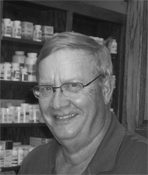 | Glen Mathis has been the co-owner of Mathis Drug Store in Girard since 1983. For more information or to reach Glen, please call 620-724-4313. |
Health & Medicine
2010-12-01 14:26:00
Drug safety and holiday interactions
Question: I take many medications, and this season I am planning on attending several holiday gatherings. Are there general concerns regarding drug safety and interactions those taking medications should be aware? How can I be sure to be safe?
Answer: Yes, that question gets asked frequently of my wife and I, who also is a pharmacist. “How will the medications I am taking mix with alcohol?” Although some drugs are not greatly affected by alcohol, its the rate of absorption.
Prescription drugs :
Countless medications interact harmfully with alcohol. Alcohol’s effects are heightened by medicines that depress the central nervous system, alcohol is a brain depressant, therefore additive with other CNS depressants such as antihistamines, narcotics, Xanax, Valium, and opiates. Antidepressants, anti-anxiety drugs, and some painkillers that combine acetaminophen and narcotics, such as Vicodin,for example, could cause severe liver damage when mixed with alcohol.. In addition, medicines for certain disorders, including diabetes, high blood pressure and heart disease, can have harmful interactions with alcohol.
Using alcohol with a prescribed drug or an over the counter, known as OTC, may affect your liver’s ability to metabolize the medication and can decrease the medications effectiveness. The combination of drugs can also multiply the effects of the alcohol and the medication and may cause liver damage.
People who drink alcohol excessively have a one and a half to two times increase in the prevalence of hypertension (an arterial disease in which chronic high blood pressure is the primary symptom. Abnormally elevated blood pressure. The association between alcohol and high blood pressure is particularly noticeable when alcohol intake exceeds five drinks per day. The connection is a dose-related phenomenon. In other words, the more alcohol consumed, the stronger the link with hypertension.
Impairment can occur at significantly lower levels of blood alcohol levels due to this additive effect on the brain. For example: alcohol usage and concomitant ingestion of opiates. Effects of alcohol on the liver via P450 enzyme causes a reduced metabolism of other medications and therefore may increase the concentration of a given drug which is metabolized by this enzyme.
Sedative’s (sleeping pills):
Using alcohol with barbiturates, tranquilizers or sleeping pills will multiply the sedative effects of both drugs, which can slow down your CNS enough to cause loss of consciousness, a coma or death.
Antibiotics:
The effects of combining antibiotics and alcohol can vary, depending on the specific antibiotic. Alcohol doesn’t diminish the effectiveness of most antibiotics. However, antibiotics and alcohol can cause similar side effects, such as stomach upset, dizziness and drowsiness. When you combine antibiotics and alcohol, these side effects may increase.
A few antibiotics such as, Metronidazole (Flagyl) Tindamax, and Trimethoprim-sulfamethazone, (Bactrim)- should not be mixed with alcohol because this may result in a more severe reaction.
With this known, the term “Synergistic” may sound familiar to some. This is the capacity of two or more drugs acting together so that the total effect of these drugs is greater than the sum of the effects if taken independently.
Mixing beverage alcohol with other drugs can have unpleasant and sometimes fatal effects. Reactions vary; potentiating effect is the joint effect of two drugs taken together being greater than the sum of the effects of the two alone. Mixing alcohol, a CNS depressant and the pharmacological effect is multiplied or exaggerated.
Modern Health terms, lists the multiple effects and drug reactions that may be produced when combined with alcohol.
The best advice, as a Pharmacist, that I can give you is Moderation. If there are any concerns that you have with any medications that you are taking do not hesitate to call your pharmacist to ask about using alcohol with any prescribed and OTC drugs.


